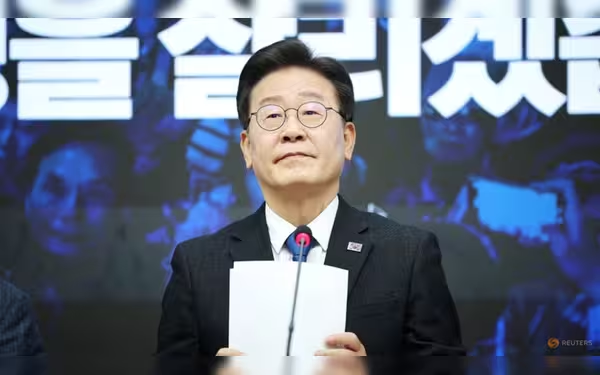Thursday, July 4, 2024 06:20 PM
Lee Jae-myung indicted on bribery charges
- Accused of involvement in transferring funds to North Korea through an underwear maker
- Facing mounting legal challenges despite maintaining innocence
- Reflects the importance of transparency and accountability in governance
 Image Credits: channelnewsasia
Image Credits: channelnewsasiaThe recent indictment of Lee Jae-myung, leader of the Democratic Party in South Korea, on bribery charges involving funds transfer to North Korea highlights the importance of transparency and accountability in governance.
South Korea's political landscape has been rocked by the recent indictment of Lee Jae-myung, the leader of the Democratic Party, on bribery charges. The allegations stem from an alleged plot involving an underwear maker to transfer funds to North Korea and arrange a visit to Pyongyang during Lee's time as a provincial governor.
The accusations suggest that Lee was part of a conspiracy to send US$8 million to North Korea through the Ssangbangwool Group, a business conglomerate known for its underwear production. This scandal has deepened with Lee's deputy already being convicted of bribery and illegal fund transfers related to the case.
Despite maintaining his innocence and denying any involvement in the activities that transpired in 2019 and 2020, Lee faces mounting legal challenges. He has criticized the prosecutors and questioned the validity of the charges against him, further complicating his political future.
This incident is not the first of its kind in South Korea's history. Similar controversies have arisen in the past, where government officials were found guilty of transferring funds to North Korea, straining diplomatic relations between the two Koreas.
One notable example dates back to the early 2000s when illicit funds were sent to Pyongyang through the Hyundai Group, impacting business ties between North and South Korea. These instances have hindered diplomatic efforts and cast a shadow on inter-Korean relations.
As Lee Jae-myung navigates through these legal challenges, his political future hangs in the balance. Despite the cloud of corruption allegations, Lee remains a prominent figure in South Korean politics and a potential candidate for the upcoming presidential election in 2027.
The implications of this case extend beyond individual culpability, highlighting the importance of transparency and accountability in governance. It serves as a reminder of the need for ethical conduct among public officials to uphold the integrity of democratic institutions.













